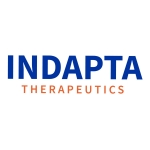
Indapta Therapeutics Announces New Preclinical Data Demonstrating Proprietary G-NK Cells Enhance Efficacy of Monoclonal Antibodies in Multiple Myeloma
– Results published in Blood Advances –
SAN FRANCISCO--(BUSINESS WIRE)--Indapta Therapeutics, Inc., a biotechnology company developing and commercializing an NK (natural killer) cell therapy platform for the treatment of blood cancers and solid tumors, today announced the publication of new preclinical data in Blood Advances demonstrating Indapta’s proprietary allogeneic FcεRIγ-deficient G-NK cells in combination with an FDA-approved monoclonal antibody (mAb) resulted in greater than 99.9% tumor reduction in a preclinical cancer regression model of multiple myeloma compared to conventional NK cells. G-NK cells are a naturally occurring subset of NK cells that when expanded and “turbocharged” using Indapta’s proprietary manufacturing process, boost the efficacy of mAbs and can overcome the cost, inconsistency, and possible toxicities associated with autologous T-cell therapies commonly used in the treatment of multiple myeloma.

“These results suggest Indapta’s G-NK cells have the potential to be a potent off-the-shelf NK cell therapy that could enhance the efficacy of most mAbs,” said Guy DiPierro, founder and chief executive officer of Indapta. “The promising results showed G-NK cells, compared to conventional NK cells, significantly enhanced anti-tumor cell activity of two FDA-approved mAbs for multiple myeloma and were able to maintain this augmented activity, expand in vivo, and have greater persistence even after cryopreservation. Together with a simplified and consistent, high-yield commercial-scale manufacturing platform at Lonza, we have the potential to produce an NK cell therapy with outstanding efficacy at a lower cost than other engineered cell therapies.”
Austin Bigley, Indapta’s vice president, research and development, said, “This data suggests our G-NK cell therapy, which has been optimized with a donor phenotyping and genotyping selection process and our propriety expansion method produces a highly functional, anti-tumor NK cell product when coupled with a therapeutic antibody.”
This preclinical study examined the ability of G-NK cells to improve the efficacy of mAbs in multiple myeloma. Results from in vitro assays showed G-NK cells had six-fold higher anti-myeloma cell-killing activity compared with conventional NK cells when combined with the mAb daratumumab or elotuzumab (p<0.001). Separately, in a murine persistence study, cryopreserved G-NK cells showed more than 10 times greater persistence in peripheral blood (p<0.001) and spleen (p<0.001) compared with conventional NK cells at Day 31 post-infusion. Persistence in bone marrow was also higher (p<0.05). Additionally, in a mouse model of multiple myeloma that investigated tumor regression, the combination of G-NK cells and daratumumab led to a greater than 99.9% reduction in tumor burden compared with the combination of conventional NK cells and daratumumab (p<0.001). At Day 57 post-tumor inoculation, all seven mice treated with the G-NK cells in combination with daratumumab were alive, and the myeloma tumor burden was eliminated in five of seven mice. In contrast, no mice treated with conventional NK cells and daratumumab survived to Day 57. Further, Indapta allowed the cancer to grow for two weeks post-inoculation until therapy was started, resulting in a cancer regression model as opposed to a cancer suppression model, as is often seen in other pre-clinical NK cell models.
“We believe these findings underscore the promise of Indapta’s naturally occurring G-NK cell therapy to augment the effects of therapeutic antibodies more than conventional NK cells,” said Nina Shah, M.D., study investigator and professor, Department of Medicine, University of California, San Francisco. “The data suggest that Indapta’s G-NK cell therapy have the potential to be a much needed, universal allogeneic cell source that could amplify the effect of therapeutic antibodies in patients, such as those with relapsing or refractory multiple myeloma.”
Indapta plans to file an Investigational New Drug (IND) application for its G-NK cell therapy in combination with a mAb in multiple myeloma by the end of 2021 and expects to initiate clinical trials in early 2022.
About Indapta’s G-NK Cell Therapy
Indapta Therapeutics is developing a universal, allogeneic G-NK cell therapy designed to substantially improve the cytotoxicity of monoclonal antibody (mAb) therapy in multiple cancers. G-NK cells are a specific and potent subset of NK (natural killer) cells with specialized anti-tumor activity resulting from an epigenetic change rather than engineering. Indapta has further enhanced G-NK cells via specific G-NK cell subset selection and its proprietary manufacturing process, which, when combined, produce a G-NK cell therapy that demonstrates higher efficacy, persistence and enhanced cryopreservation.
When a mAb binds to the tumor target and Indapta’s G-NK cell therapy, it initiates the release of dramatically more cancer-killing compounds than conventional NK cells, allowing for increased efficacy and potentially less frequent dosing. Indapta’s off-the-shelf G-NK cell therapy is further differentiated from other NK cell therapies in that it is a cell banked product with low variability. In vivo studies have demonstrated the safety and efficacy of Indapta’s G-NK cell therapy.
About Indapta Therapeutics
Indapta Therapeutics, Inc. is a biotechnology company focused on developing and commercializing a proprietary allogeneic cell therapy to treat multiple types of hematologic cancers and solid tumors. The company has developed allogeneic FcεRIγ-deficient natural killer cells, known as G-NK cells, and is working to bring this off-the-shelf cell therapy to patients to address the limitations of currently available autologous T-cell therapies. Headquartered in San Francisco, Indapta was founded in 2017 based on a discovery by Sungjin Kim, Ph.D., at UC Davis. Indapta’s scientific founders are Dr. Kim and John Sunwoo, M.D., at Stanford University. For more information, please visit www.indapta.com.
Contacts
Nicole Raisch Goelz
408-568-4292
ngoelz@realchemistry.com
Editor Details
-
Company:
- Businesswire
